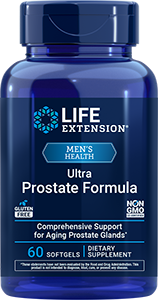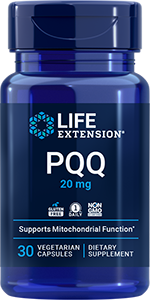
Newsletter
Newsletter
Acute cardiovascular disease patients with low CoQ10 have greater risk of mortality during 3.2-year median period

October 20, 2020
An investigation reported on September 16, 2020 in the journal Heart and Vessels revealed an association between increased long-term mortality risk and lower levels of coenzyme Q10 (CoQ10).
The study enrolled 242 men and women consecutively admitted to the coronary care unit (CCU) of Juntendo University Hospital in Tokyo between April 2012 and January 2013. Blood samples collected within 24 hours of admission were analyzed for CoQ10, lipids and other factors.
During a median follow-up of 3.2 years, 58 patients died of cardiac causes, carcinoma, infection, bleeding and other diagnoses. Coenzyme Q10 levels averaged 0.48 milligrams per liter (mg/L) among non-survivors in comparison with 0.58 mg/L among survivors. When subjects were categorized according to having low (less than the median level of 0.46 mg/L) or high (0.46 mg/L or more) levels of CoQ10, higher levels were associated with an adjusted 52% lower risk of dying from any cause during follow-up in comparison with lower levels.
Patients in the low CoQ10 group were found to be receiving higher doses of statins than those in the high CoQ10 group. “Therefore, low CoQ10 levels induced by malnutrition and statin treatment are a potential therapeutic target in patients admitted to the CCU,” Megumi Shimizu of Juntendo University School of Medicine and colleagues wrote.
The authors observed that research involving CoQ10 supplementation has resulted in lower levels of the inflammatory marker interleukin 6, and that levels of CRP, another marker of inflammation, were significantly lower in patients in the current study who had high CoQ10 levels compared to those with low levels.
“The present study results suggest that lower CoQ10 levels in patients with acute cardiovascular disease can predict poor long-term prognosis,” the authors wrote. “Further prospective studies are warranted to conclusively determine the effect of CoQ10 supplementation on the prognosis of patients with critical cardiovascular disease admitted to the CCU.”
Products
Apply What You’ve Learned: CoQ10 and Survival
- Studies have documented a link between lower levels of CoQ10 and a greater risk of premature mortality. For example, an earlier study conducted by the researchers involved in the study described above found lower levels of CoQ10 among coronary care unit patients who experienced in-hospital mortality in comparison with survivors.1
- A randomized trial that evaluated the effects of supplementation with CoQ10 and selenium resulted in a risk of cardiovascular mortality that was less than half that of a placebo group during a 5.2-year period.2
- In another randomized trial, thrice-daily supplementation with CoQ10 for a two-year period among chronic heart failure patients was associated with a significantly lower risk of mortality from cardiovascular disease or all causes in comparison with a placebo group.3
- Coenzyme Q10 is essential for the production of energy by the mitochondria of most cells in the body.4 As such, healthy levels of CoQ10 are needed by all the body’s organs, including the heart, to function optimally.
References
- Shimizu M et al. Heart Vessels. 2017 Jun;32(6):668-673.
- Alehagen U et al. Int J Cardiol. 2013 Sep 1;167(5):1860-6.
- Mortensen SA et al. JACC Heart Fail. 2014 Dec;2(6):641-9.
- Crane FL. J Am Coll Nutr. 2001 Dec;20(6):591-8.
Featured Life Extension Magazine® Article
Nutrients that Provide Benefits of Caloric Restriction
by Nancy Kovacs
More than any other technique, calorie restriction has been associated with better health and delayed mortality in a wide variety of species. Although mortality studies have not been conducted with humans, research has documented a number of health benefits among calorie restriction practitioners.
However, many people find the thought of lifelong commitment to consuming significantly fewer calories daunting. This is where calorie restriction mimetics come in. By eliciting some of the effects of calorie restriction without necessitating the adoption of a low calorie diet, calorie restriction mimetics are a smart choice for those interested in living longer in good health.
Resveratrol, nicotinamide riboside, Gynostemma pentaphyllum, hesperidin, curcumin, quercetin, apigenin and fisetin are among naturally-occurring compounds that activate different cellular changes associated with calorie restriction.
What's Hot
Health Concern
CoQ10 improves statin tolerability in randomized trial
Results from a randomized trial reported on October 21, 2019 in Drug Design, Development and Therapy indicate a potential protective effect for supplementation with the antioxidant coenzyme Q10 (CoQ10) against side effects induced by statin drugs that would otherwise render treatment intolerable.
Atherosclerosis and Cardiovascular Disease
Atherosclerosis is the narrowing and hardening of arteries due to the accumulation of plaque.
Related Life Extension Magazine® Articles
Life Extension Magazine® Issue Now Online
A remarkable number of healthy-longevity findings have been published over the past 18 months.
Moving? Need to update your address?
If you currently receive Life Extension Magazine® and your address has changed, please let us know. Simply call 1-800-678-8989, and we'll gladly update your information in our systems. Or login to your account on LifeExtension.com.









